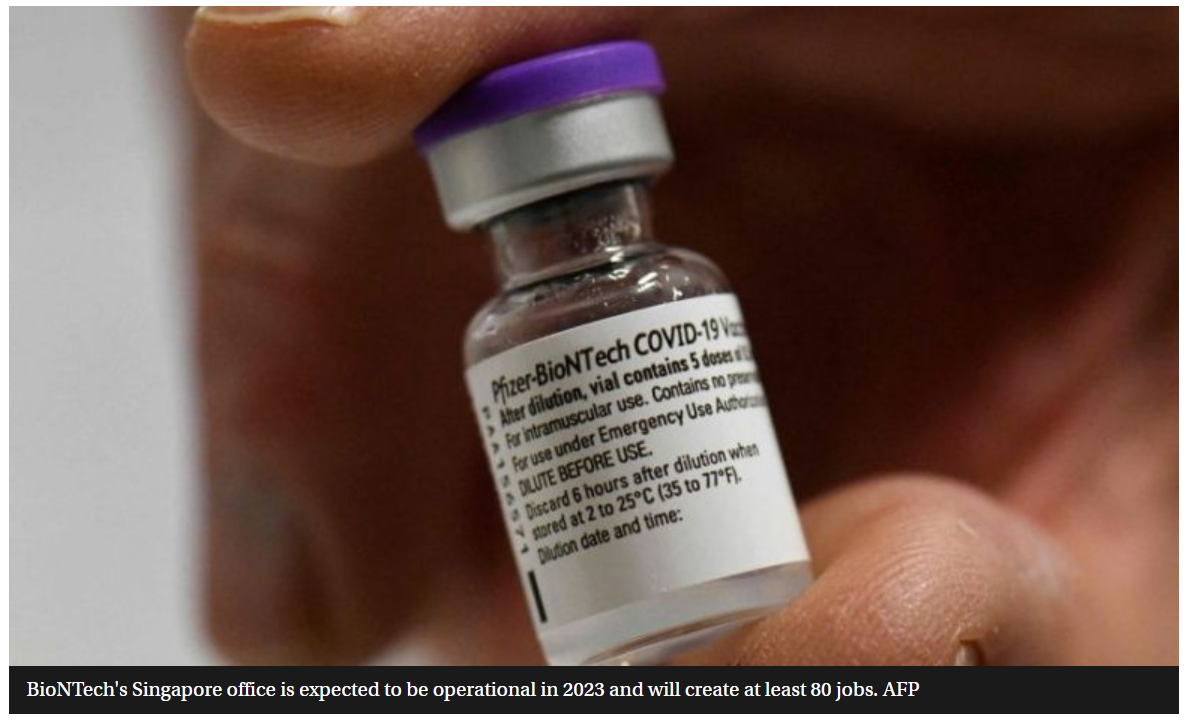Vaccine maker BioNTech to set up regional HQ, manufacturing site in Singapore
BioNTech, the vaccine maker that has partnered with Pfizer on its Covid-19 shot, will be designating Singapore as its regional headquarters for Southeast Asia, and will set up an mRNA manufacturing facility in the city-state.
It plans to open its Singapore office and start the construction of the manufacturing facility this year, subject to planning approval. The site is expected to be operational in 2023 and will create at least 80 jobs, the German company said on May 10.
These include roles in quality control, quality assurance and management.
It added that the expansion plan is supported by Singapore’s Economic Development Board (EDB).
BioNTech CEO and co-founder Ugur Sahin told reporters in a web conference on May 10 that establishing a manufacturing hub in Singapore will mean that “a certain percentage [of Covid-19 vaccines manufactured] will go to Singapore”.
He also said: “But we have to be clear that starting a manufacturing building in Singapore will not help us in the next 12 months with regard to the global supply [of the Covid-19 vaccine].
“The global supply can only be addressed by increasing the existing production capacities. We did that and they will continue to do that in the next 12 months.”
The plan is to deliver up to three billion doses in 2021, together with Pfizer – more than 50 per cent higher than initially announced. Over 40 per cent will be supplied to low- and middle-income countries, Dr Sahin added.
The surge in global demand for the vaccine has seen more manufacturing sites set up in countries such as Germany and Belgium, as well as states in the US, to boost production.
Demand has outstripped supply in almost every country. Across the world, over one billion doses of Covid-19 vaccines have been administered.
The World Health Organisation has said the world is in a “vaccine crisis”, calling on the Group of Seven countries to fund the global Covid-19 recovery and ensure most adults around the world get immunised.
Dr Sahin added that BioNTech is in discussions on whether to acquire an existing building or build new infrastructure to house the new manufacturing facility.
In response to questions on the value of the investment in Singapore, Dr Sahin said it is “in the range of hundreds of millions of US dollars”.
He added: “We’re looking at this as a long-term investment in biotech in Singapore … It extends beyond Covid-19. Our hope here is that we can establish both a regional and even potentially global supply for a range of different vaccines and therapies based in Singapore.”
Minister of Trade and Industry Chan Chun Sing, who also participated in the web conference, said the venture will be a boost to the biopharmaceutical sector in Singapore.
“Every significant investment that we attract into Singapore will certainly strengthen the overall ecosystem within Singapore because this will enable us to grow our talent pool – from management to production control and quality assurance.”
The new facility will use cutting-edge manufacturing and digital infrastructure, and will be equipped to produce a range of novel mRNA vaccines and therapeutics for infectious diseases and cancer, said BioNTech.
“The envisioned site will bring highly automated and end-to-end mRNA production capabilities across drug substance, drug product and fill-and-finish, with an estimated annual capacity of several hundred of million doses of mRNA-based vaccines depending on the specific vaccine,” it added.
The Pfizer-BioNTech coronavirus vaccine is based on mRNA technology, which uses a chemical messenger to instruct cells to make proteins that mimic the outer surface of the new coronavirus, which the immune system learns to recognise as a foreign invader and mounts a defence against.
mRNA relies on synthetic genes that can be generated and manufactured in weeks, and produced at scale more rapidly than conventional vaccines.
EDB chairman Dr Beh Swan Gin said the investment will enable Singapore to “develop capabilities in an important new therapeutic modality as part of the strategy to grow our biopharmaceutical industry”.
“In particular, BioNTech’s mRNA manufacturing facility will contribute significantly to the region’s ability to address future pandemic threats.”
THE STRAITS TIMES (SINGAPORE)/ASIA NEWS NETWORK


 English
English




